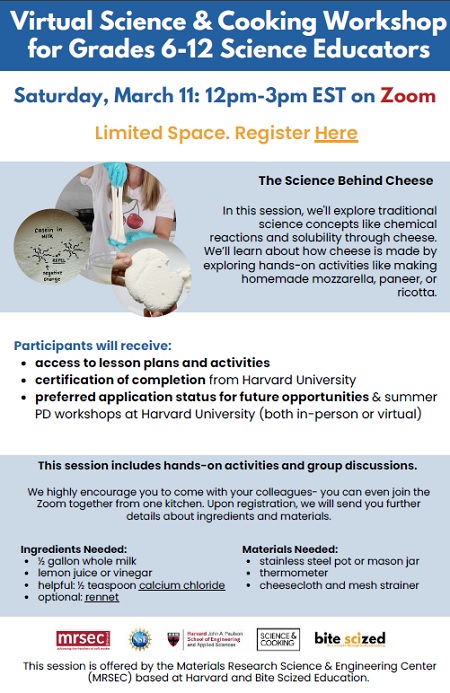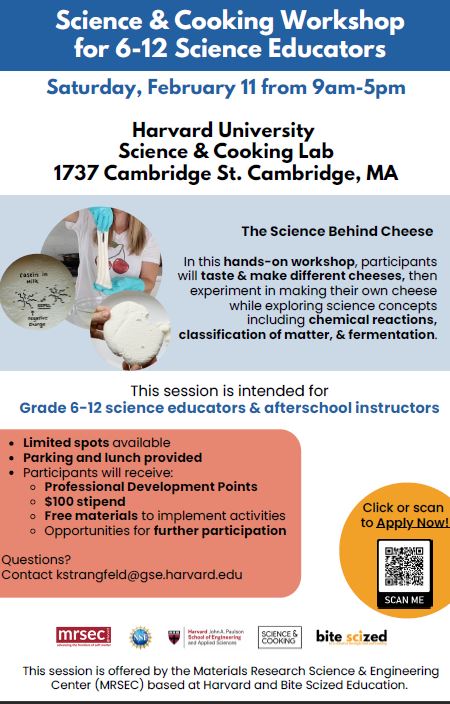Science & Cooking Workshop for 6-12 Science Educators
The Science Behind Cheese
This focused workshop is offered by the NSF Division of Materials Science, the Materials Research Science and Engineering Center Program, and with Kate Strangfeld, Ed.M.'22, to present and educate the educators in the science of matter through the art of cooking with different cheeses and their textures.
March 11, 2023
Harvard's Science and Cooking hands-on virtual workshop "The Science Behind Cheese" for science educators, community program instructors, and after-school program leaders in grades 6-12 are invited to apply to participate in a session for incorporating food and cooking into STEM lesson plans.
The event will occur on Saturday, March 11, 2023 from 12pm to 3pm EST, and it will be an online event.
In this session, we'll look at cheese to explore science concepts including chemical reactions and types of mixtures. We'll learn about how cheese is made by exploring hands-on activities including homemade mozzarella, paneer, or ricotta. You will be able to eat your experiments while learning concepts that are mapped to NGSS and Massachusetts State Standards. This session includes hands-on activities and group discussions. We highly encourage you to come with your colleagues- you can even join the Zoom together from one kitchen.
Participants who attend this virtual workshop will receive access to free lesson plans and activities, a certificate of completion from Harvard University and preferred application status for future opportunities and summer professional development workshops. Participants who complete a brief pre-survey, pilot the lesson or activity and follow up with the completion of a survey and 20-minute zoom interview to give feedback will be eligible for PDPs or further certificates.
Ingredients:
See our ingredient recommendations for calcium chloride and rennet. This package of calcium chloride is $10 and is plenty to do cheesemaking activities with multiple classes. Similarly, the microbial rennet is $11 and comes in a packet of 12 tablets. Each recipe uses ¼ tablet.
- ½ gallon whole milk
- ½ teaspoon food-grade calcium chloride (optional but recommended- especially if using pasteurized milk)
- 3 tablespoons fresh lemon juice (about 2 lemons), white vinegar, or diluted citric acid
- Optional: microbial rennet (only if making mozzarella or interested in further experimentation)
- Optional (for serving): jam and crackers
Materials:
Buy our recommend materials on Amazon:
- stainless steel pot
- thermometer
- cheesecloth and mesh strainer (you can also use paper towels for ricotta)
- digital measuring scale or measuring cups/spoons
Prior Science Behind Cheese Event
Harvard's Science and Cooking hands-on workshop "The Science Behind Cheese" for science educators, community program instructors, and after-school program leaders in grades 6-12 are invited to apply to participate in a session for incorporating food and cooking into STEM lesson plans.
The event will occur on Saturday, February 11, 2023 from 9am to 5pm at the Harvard University Science & Cooking Lab, 1737 Cambridge Street, Cambridge, MA.
In this session, participants will learn about how cheese is made through hands-on activities and demonstrations including homemade mozzarella, paneer, and ricotta, and taste the differences between each. Experimenting with ingredients while exploring science concepts to include chemical reactions, classification of matter, types of mixtures, and fermentation will be covered.

It was supported in part by the Harvard University Materials Research Science and Engineering Center (MRSEC) under grant DMR-2011754 from the National Science Foundation.


